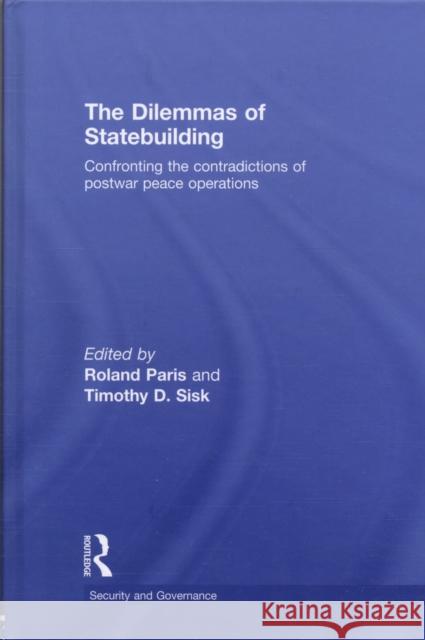The Dilemmas of Statebuilding: Confronting the Contradictions of Postwar Peace Operations » książka
The Dilemmas of Statebuilding: Confronting the Contradictions of Postwar Peace Operations
ISBN-13: 9780415776288 / Angielski / Twarda / 2009 / 370 str.
The Dilemmas of Statebuilding: Confronting the Contradictions of Postwar Peace Operations
ISBN-13: 9780415776288 / Angielski / Twarda / 2009 / 370 str.
(netto: 883,80 VAT: 5%)
Najniższa cena z 30 dni: 856,36
ok. 30 dni roboczych.
Darmowa dostawa!
This book explores the contradictions that emerge in international statebuilding efforts in war-torn societies. Since the end of the Cold War, more than 20 major peace operations have been deployed to countries emerging from internal conflicts. This book argues that international efforts to construct effective, legitimate governmental structures in these countries are necessary but fraught with contradictions and vexing dilemmas.. Drawing on the latest scholarly research on postwar peace operations, the volume:
- addresses cutting-edge issues of statebuilding including coordination, local ownership, security, elections, constitution making, and delivery of development aid
- features contributions by leading and up-and-coming scholars
- provides empirical case studies including Afghanistan, Cambodia, Croatia, Kosovo, Liberia, Sierra Leone, South Africa, and others
- presents policy-relevant findings of use to students and policymakers alike
The historic experiment in postwar peacebuilding and state-building appears to have arrived at a crossroads, facing diverse criticisms and doubts. Today there are up to seventy states vulnerable to so-called state failure and this book argues that state-building is too important to abandon as an objective. It acknowledges that the international community may not be able to address every case of state fragility or failure, but demands that it should help countries emerging from civil wars, since these are at greatest risk of falling into the cycle of chronic violence.
The authors explain that a careful rethinking of state-building is needed before major decisions are made on whether, and how, to reinvest. It seeks to identify some of these competing imperatives and to begin the process of thinking through how they may be reconciled in the hopes of improving the design of future missions. Sharing a consensus, but offering a variety of approaches, methodologies, case analyses, and recommendations, the essays in this volume provide a deeper understanding of the dilemmas of state-building. The book brings together respected experts from around the world and is divided into thematic sections:
- I: Contexts of State-Building
- II: Challenges of Security
- III: Challenges of Political Economy
- IV: Challenges of Institutional Design
- V: Challenges of Autonomy and Dependence
- VI: Reflections and Conclusions.
It will be of interest to students and scholars of peacebuilding, post-conflict reconstruction, nation-building and state-building, international security conflict resolution and development, and at military colleges and on government training courses.











